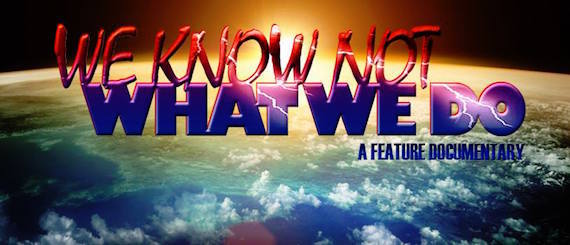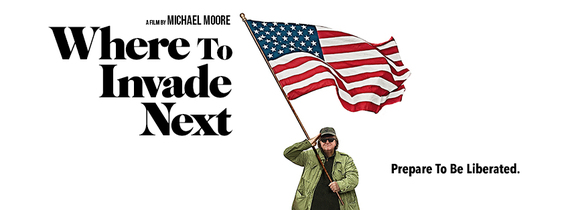When I was in film-school in the 1990s I was clearly told by my lecturer that a film can't change the world. He went on to produce international hit movies, and I started making films to try and change the world.
Granted, his advice was pre documentaries like An Inconvenient Truth or Super Size Me that have shifted the world's perception via the silver screen, but now we are firmly in the digital age and films are easier to make and easier to share. And with the digital revolution comes transformational media -- a new (and not so new) genre of filmmaking, which attempts to open the minds and hearts of the audience.
Lainie "Sevante" Wulkan interviews filmmakers of "transformational films" for Zeta Global Radio to share more about the genre with her listenership based in over 50 countries.
I was interviewed about my experience making the Dalai Lama Film Road to Peace alongside Elizabeth Gaylynn Baker, who discussed her brilliant new environmental film We Know Not What We Do, currently taking the festival circuit by storm.
Recently launched March 2015, Sevante's ZGR show "honors conscious musicians, writers, thinkers, filmmakers and more." During our interview she shared her motivation for the making the show: "The Conscious Filmmakers series allows me to explore one of my biggest passions; raising the profile of incredible filmmakers like the two of you. It's about how the power of the media, film, music, TV and the arts makes such a difference."
Me: "I remember the first day I walked home with a camera from college. I had this camera under my arm and realized I had the most powerful weapon in the world. The camera and the way one uses it can change the world. It literally changes the way that we see the world. We see it through that lens. Photography used to do it and now it's film. Once you take on a subject like the environment or spirituality, there's a huge responsibility to share it with an audience in the best possible way."
Sevante explains how the genre has taken the baton from those who have come before: "Looking at organizations like Greenpeace, it's clear that without the modern technologies we use regularly, in order to have widespread impact, you had to become the news through an action the media couldn't ignore."
Visionaries like Michael Moore (Roger & Me, Fahrenheit 9/11, Sicko) inspire us to create documentary films that have an ability to shed light on subjects that mainstream television docs won't touch. It's truly something that the mainstream need to see, in order to take action. An individual can change the world.
There's an urgency to transformational films that expose an area of our world that needs attention. You won't find the genre covering lifestyle issues or celebrities unless it directs the audience to benefit themselves or others.
Elizabeth Gaylynn Baker shares the experience of making her environmental film We Know Not What We Do:
"This film is a love letter to human beings. It's an invitation to make a moral and spiritual shift about the way we live on the planet if we do not want to be extinct." She continues, "As filmmakers, we think the goal is making money, being successful, being a star, blah, blah, blah, but that is an illusion. Somehow you have to see through all of that and realize the real goal is to get as deep into your soul as you can get. I didn't set out to create a resume or seek that kind of success. I set out to follow and go deeper into my soul. This opportunity came to me and I trust enough to take it on, even though I wondered what it was about. I believe that that is the moral and spiritual shift we as human beings need to make. It isn't the golden calf, it isn't the Oscar, it isn't any of those things we have in our head. It's learning to trust Spirit."
Transformational and inspiring films are produced because an impassioned individual takes up a cause, assuming huge risk in the process. These projects are usually funded independently and can take years of a filmmaker's life to create.
So why take on such a huge task?
"Creating transformational film often becomes the filmmaker's "life-mission," explains Sevante "and the projects have an inspiring effect on their creator. In the age of social media, our attention can be easily diluted. Film is a format that presents the topic quickly and efficiently. ZGR highlights films like Road to Peace via a platform that hopefully paves the way for a shift in perspectives and priorities. Even though Zeta Global Radio and other conscious media outlets offer a variety of platforms, you still don't see or hear documentary filmmakers on national mainstream morning broadcast shows. You'd think in this age, we'd be more expansive, but there's still a separation between the mainstream and conscious media markets. It's my hope that one day, we will be all one."
Me: "Many filmmakers in my position are very passionate about their subject and they know they need to get out into the world. You keep working it, screening the film for audiences wherever and whenever it's relevant; you keep getting it out in front of people as we do with Road to Peace.
It's time to engage people in a discussion. Bringing audiences together to talk about subjects like the Paris terrorist attacks is vital. It's the reason we do what we do. In many ways, it's a new art form. It goes far beyond the old paradigms; certainly the old realms of making documentaries for television.
You need only gain awareness of what you're doing within your own mind. Use self-love and self-compassion to be comfortable with the decisions you make, who you are and the way you are in the world. That will fundamentally change the world around you, as well as change your own world. It will have a profound effect on your family, the people you work with and your community. It's huge!"
Sevante: "Transformational films are here to stay. They have a vital role in sharing the philosophies of our time; through the individual watching the film, or communities congregating to experience the film via private or public screenings. The end-result is the world coming together and awakening to critical subject matters that need discussion. That's the first step towards change."
Check out these 7 inspiring Transformational Films:
Hearts In The Himalayas - Medical doctors who bring supplies to remote villages.
I Am - Tom Shadyac's departure from mainstream movies to consciousness.
Sold - Anti-trafficking of children.
Vanishing of the Bees - Disappearing bee colonies around the world.
Brave Miss World - The rape of Miss World and her activism afterwards.
The Urban Elephant - Alison Argo's Film on Elephant Abuse.
One Track Heart - The story of Krishna Das and his transformation from depression to the world's greatest Kirtan Artist.
But remember to hold on to your hats! These films may enlighten you or they may shock you. But the one thing they all promise, is to shift your perception of reality, sometimes a little, sometimes a lot. Who knows, one of these films may even change your world...
Listen to the full interview from 19th December 2015 on ZGR


